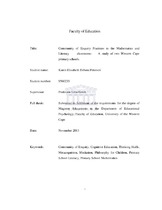| dc.description.abstract | The research explores the effects of Community of Enquiry practices on the teaching and learning of Mathematics and Literacy in two local primary schools. After the 1994 elections, both the government and education system changed in South Africa. With the introduction of Outcomes Based Education (OBE), critical outcomes that emphasized thinking and collaboration became a vital part of the curriculum. Soon after, the Education system adopted the National Curriculum Statement (NCS) and thereafter the Revised National Curriculum Statement (RNCS), which maintained these outcomes. The Curriculum and Assessment Policy Statement (CAPS) was introduced to the Foundation Phase in 2012 and to the Intermediate Phase in 2013 with the Critical Outcomes, (which emphasizes thinking) now stated as the aims of CAPS. However, no guidelines are provided regarding classroom practice. The approach to teaching these aims is not made clear. Lipman’s Philosophy for Children (P4C) is one way of working towards these aims, and promoting thinking and is consistent with many of Vygotsky’s ideas. He initiated ideas about cognitive development in which he refers to the importance of dialogue in which one is able to talk and communicate with others. Vygotsky also emphasised scaffolding where the teacher provides the learner with clues and suggestions in order to develop better problem- solving techniques and thinking habits. His concept of the zone of proximal development (ZPD) refers to the individual’s ability to accomplish more or to perform a challenging task with the proper assistance. The development of language is considered important within his theory as Vygotsky believes that individuals are born only with lower mental processes and develop their thinking ability (higher mental processes) by acquiring the thinking tools developed in a particular culture, the most important of which is language. The research followed a qualitative research methodology. The study explored the perceptions of both educators and learners after an intervention based on Philosophy for Children. Qualitative data involved two group interviews with teachers, one with the Cognitive Education Co-ordinator and interviews with four focus groups of selected Grade 5 and 7 learners (12 per group) whose teachers implemented Lipman’s Community of Enquiry pedagogy in the classroom the previous year. Quantitative data included a learner self-rating scale. All the educators of the two schools, who were involved in the classroom Community of Enquiry training, were invited to participate in the study, as were selected learners from the two Grade 5 and 7 classes at each school. I made use of thematic analysis of the interview data from both learners and teachers. Themes within the interviews were identified. Themes pertaining to teacher perception of self-change, teacher perception of learner change, and learner perceptions of self change were identified. During thematic analysis, the three research sub-questions were underlined. These were: (1) What are the teachers’ perceptions of self-change? (2) What are the teachers’ perceptions of learner change? (3) What are the learners’ perceptions of self-change? The conclusion of the study was that P4C has the potential to affect the teachers professionally and to influence the learners positively in Mathematics and Literacy classrooms. Ongoing support in cognitive education is vital in order to reach the aims required for the new CAPS curriculum. | en_US |

